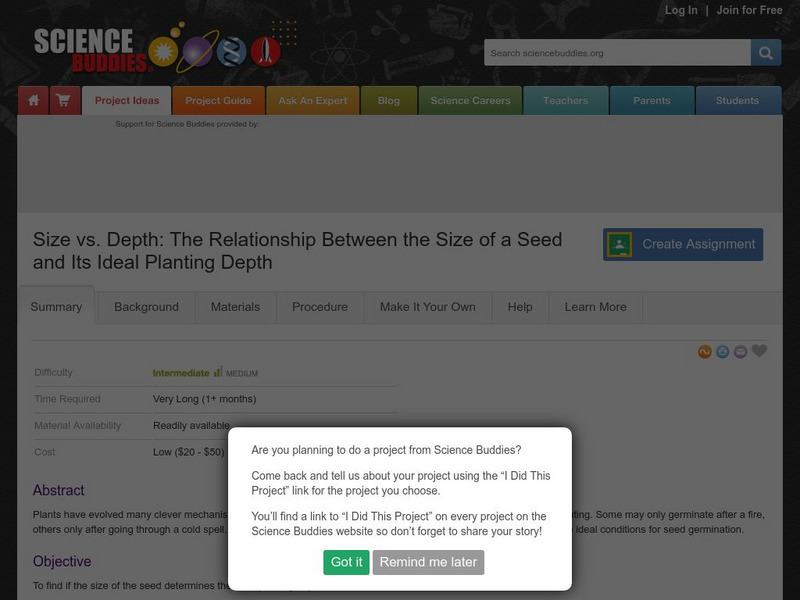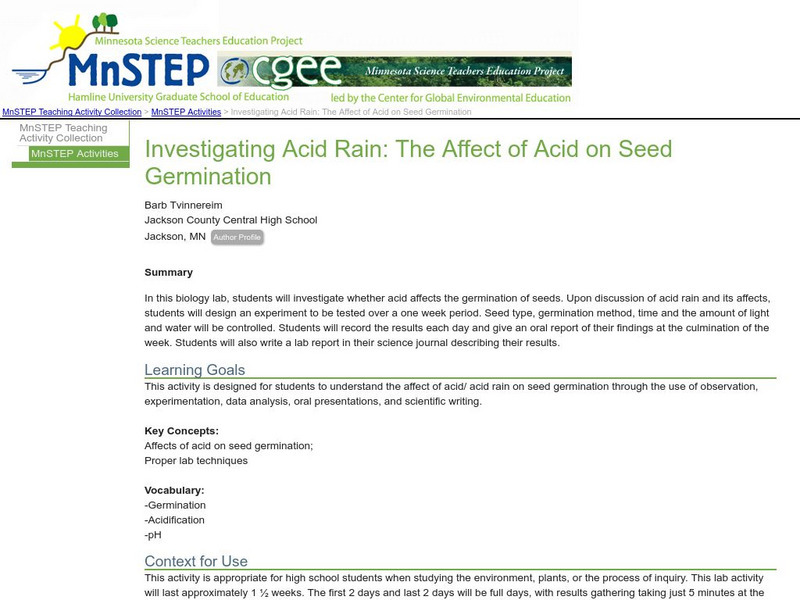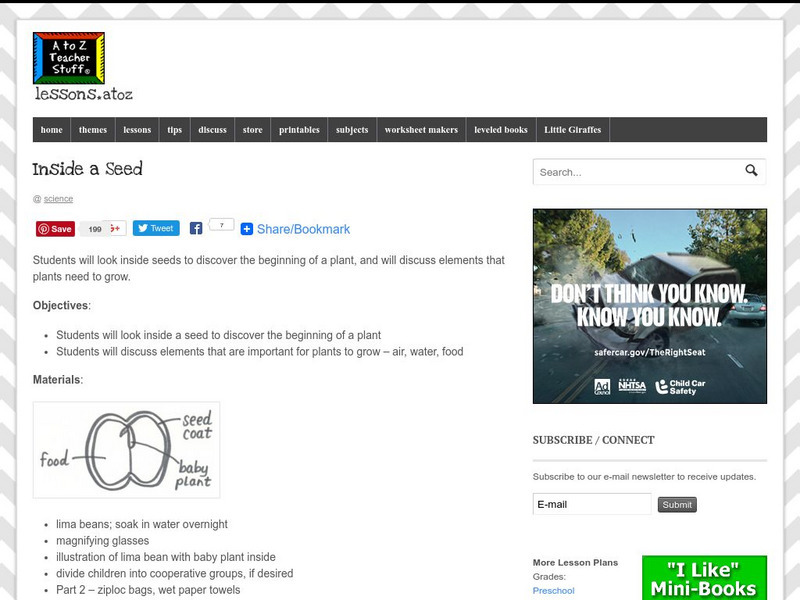Curated OER
Growing Plants
Students design and create a suitable vacuum formed shape made from MDF in which they may grow some mustard seeds. They then experiment with different conditions that it takes for seeds to germinate, setting out one set of seeds on dry...
Curated OER
A Seed Grows
Second graders begin the instructional activity by planting their own bean seed. Individually, they make predictions about how many leaves and roots their plant might grow and each day record their observations. They graph the results of...
Curated OER
Sowing Seeds of Service
Third graders use metric measuring for model and actual plan in designing a roof garden. They photograph the process, record results in a journal, and plant seedlings in small containers. Finally, 3rd graders complete an acid rain...
Curated OER
Which Way to Roots Grow?
Second graders explore roots and how they grow. They observe as seeds planted in various directions grow and record their observations. Students discuss the direction in which the roots are growing.
Curated OER
Dose-Response Relationship
High schoolers complete their observations of germinating seeds. They create a graph showing all of their data and develop a dose-response curve. They compare their data with other groups and analyze the curves.
Curated OER
Plants
Students plant bean seeds and draw pictures of the plants as they grow. They create their own garden, plant the seeds, and keep a journal of their growth.
Curated OER
Sunflower Seed House
Young scholars use sunflower seeds to make a picture of a house. This lesson uses the book, "Sunflower House."
Science Buddies
Science Buddies: Cryopreservation: Freezing Plant Tissues
Cryopreservation-storing seeds in ultra-cold liquid nitrogen-is one method for maintaining plant genetic stocks in seed banks. The purpose of this project is to observe the characteristics and outcomes of cryogenically frozen seedlings...
Science Buddies
Science Buddies: Planting Size vs. Depth
Plants have evolved many clever mechanisms to ensure that their seeds will wait for appropriate conditions before sprouting. Some may only germinate after a fire, others only after going through a cold spell. This project explores one...
Other
Rose Hills Foundation Conservatory for Biological Science
All about plants has information on plant parts--seeds, flowers, fruits, roots, and spores--and plant processes--seed dispersal, germination, pollination, and photosynthesis. You can also take a tour of this Los Angeles-based...
PBS
Pbs Learning Media: Sock Seeds
In this ZOOMSci experiment, you're invited to walk through a grassy or weedy field in your stocking feet, then plant a sock and see what grows.
Children's Museum
The Children's Museum of Indianapolis: Plants Alive: Garden in a Glove Journal
Young scholars will observe the germination and growth of plants from seeds over the course of several days, and record their observations in a journal.
Science Education Resource Center at Carleton College
Serc: Investigating Acid Rain: The Affect of Acid on Seed Germination
In this biology lab, students will investigate whether acid/acid rain affects the germination of seeds through the use of observation, experimentation, data analysis, oral presentations, and scientific writing.
Science Education Resource Center at Carleton College
Serc: Tree Leaf Identification and Leaf Display Activity
In this Biology field activity, students collect tree leaves and seeds to make an identified collection after drying in a plant press, a phone book, or in magazines.
NC State University
Ncsu.edu: Adventures of the Agronauts
This site is an online science curriculum on how to grow plants on the Moon. There are six lessons that have a glossary also included. There are movies that demonstrate concepts, and teacher resources. The sites topics cover, the Earth,...
PBS
Pbs Kids: Plum Landing: Seed Racer
Help Plum collect all the different kinds of seeds before time runs out. Fun, interactive game shows how different seeds propagate. Look out for those crows!
A to Z Teacher Stuff
Atozteacherstuff: Inside a Seed
atozteacherstuff lets you take a closer look at the inside of a seed by using this lesson plan to "discover the beginning of a plant."
BiologyWise
Biology Wise: Monocot vs. Dicot
One way plants have been classified has been based on the number of cotyledons in the seeds. The differences between monocots and dicots are listed along with some helpful facts.
Science4Fun
Science4 Fun: Seed Germination
Resource describes the process of germination and includes the parts of a seed, environmental conditions, and rate of germination.
HotChalk
Hot Chalk: Lesson Plans Page: Kick Off Seed Explorations
This simple lesson plan is designed to have young students become more familiar with fruit seeds by identifying fruit that contains seeds/no seeds, gathering seeds from fruit, explaining the importance of seeds, explaining that seeds...
HotChalk
Hot Chalk: Lesson Plans Page: Planting Seeds
This simple lesson plan is designed to help young students be aware of how seeds sprout, and that seeds grow into plants.
Curated OER
Clip Art by Phillip Martin: Seeds
A clipart illustration by Phillip Martin titled "Seeds."
















